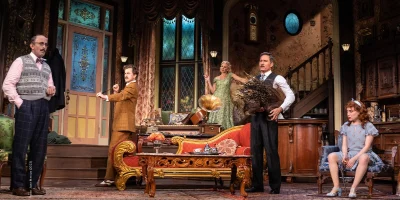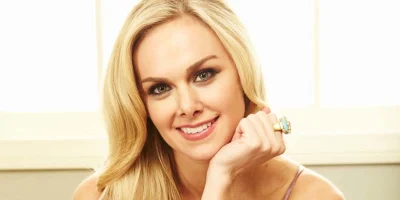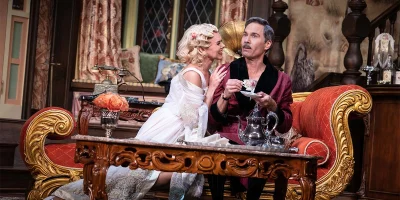
'The Cottage' cast and creatives reveal the comedy icons who influence them
Sandy Rustin's Broadway play puts a fresh twist on the old-fashioned farce, so the team naturally draws inspiration from classic comedians and writers.
When Sandy Rustin's The Cottage took up residence on Broadway in early July, the Hayes Theater became like an exhibition hall, displaying a living tribute to the history of comedy.
The Cottage, which plays there, is a farce about six aristocrats discovering they're all cheating on each other with each other (and it's best to go in knowing no more). It's a comedy of manners in that this high-class crowd is certainly not behaving with decorum. It's also a feminist reworking of those age-old genres, as leading lady Sylvia questions the value of always relying on a man for happiness.
Those descriptions alone cover millennia of humor. The farce — as defined by absurd situations and characters as well as physical comedy — dates back to 15th-century France. The comedy of manners, while dating back even further to ancient Greece, is most closely associated with the 17th-century English Restoration period.
The genre got a renaissance in the late 19th and early 20th centuries thanks to playwrights like Noël Coward. His works — mostly set in early 20th-century English high society, as is The Cottage — largely inspired Rustin and, in turn, her actors.

"I watched a lot of Noël Coward films and stage productions," said Laura Bell Bundy on her preparation to inhabit the role of Sylvia. "I was playing on twists and exaggerated versions of those various characters."
She specifically recalled watching Coward's Present Laughter, starring Kevin Kline, Cobie Smulders, and Kate Burton on Broadway, and adopting the style of "their delivieries and their comedic timing." But Bundy also named Bette Midler, Lucille Ball, and Carol Burnett as inspirations — much like The Cottage itself, her performance contains comedic multitudes.
And the humble actress wouldn't tout it herself, but 2007's Legally Blonde: The Musical saw Bundy subvert the "dumb blonde" trope as the sorority-girl-turned-lawyer Elle Woods, making her a Tony-nominated comedy star in her own right.
All this jives with the intention of Rustin, who acknowledges that her play is an "amalgamation of all sorts of comedic voices." She also cited Burnett, as did actress Dana Steingold, who "watched a lot of videos of both Carol Burnett and Lucille Ball doing drunk bits because [her] character [Dierdre] gets drunk, and they're both great physical comedians," she said.
Steingold called The Cottage as a whole "Carol Burnett-esque." The description is emblematic of the more recent half of comedy history the play represents: that of feminist comedy. Ball and Burnett were pioneers in expanding comedic roles and opportunities for women, which remains an ongoing movement that Rustin, Bundy, Steingold, and Lilli Cooper (who plays Marjorie and cited Maya Rudolph as her inspiration) are now all part of. Cooper, for one, also performed in a feminist farce on Broadway last summer: Selina Fillinger's POTUS, which featured an all-female cast.

And that's not even the half of the comedic influences in The Cottage — those are just the American ones. Rustin's play is set in England, remember, so the team also looked to "the great British comedies that border on silly and sophisticated all at the same time," said director Jason Alexander (yes, the Seinfeld star).
Think the sitcoms Fawlty Towers and Absolutely Fabulous, the Monty Python troupe (whose musical Spamalot gets its first Broadway revival this fall), and, for cast member Nehal Joshi, even dramatic legend Mark Rylance. "[He] isn't necessarily known as a comic icon, but if you've seen Boeing Boeing, he's really great," Joshi said. (Rylance starred in a stage production of that farce about adultery. Sound familiar?)
All this together is what makes The Cottage successful with audiences, besides the line-up of modern comedy greats that also includes Will & Grace's Eric McCormack and Saturday Night Live's Alex Moffat. Across eras and continents, certain situations, themes, and tropes — even with modern-minded updates — never stop being funny.
"These jokes are the same jokes that W.C. Fields made. These are the same jokes Lucille Ball made. These are the same jokes Noël Coward made," Joshi said. "Going back to Shakespeare, these are the jokes that we had. It's timeless."
"My old boss Jerry Seinfeld would say, 'Funny is funny is funny is funny,'" Alexander echoed. "There's something about classic, traditional structure which holds with some frequency, despite the changes in everything else in our society and our world."
Photo credit: The Cottage on Broadway. (Photos by Joan Marcus)
Originally published on



